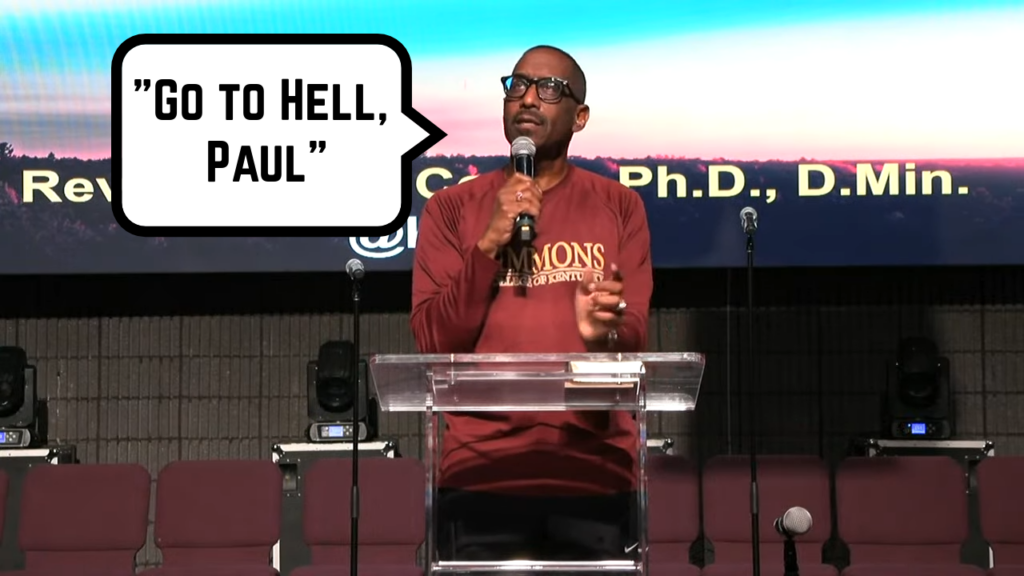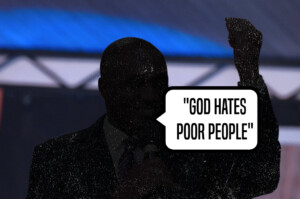Baptist Pastor Preaches That He ‘Can’t Even Look’ at Paul’s ‘Contradictory’ Bible Verses + “Go To Hell Paul”

St. Stephen Baptist Church is the largest African American Church in Kentucky and the “largest private Black employer in the state.” Boasting that “Over 98% of St. Stephen employees are from the Black Community” and that they “conduct the city’s largest voter registration campaign,” their stated mission is to “change lives, to strengthen families, and to transform communities. “
St. Stephen is led by Senior Pastor Dr. Kevin Cosby. According to his church bio, he is “He is one of our nation’s most influential leaders: He was inducted into the Gallery of Great Black Kentuckians at the Kentucky State Capitol…and was inducted into the Martin Luther King, Jr. Board of Preachers of Morehouse College.”
Two weeks ago, he preached a message titled “Slavery and the Bible where he criticizes the Apostle Paul for his behavior and statement in the book of Philemon, declaring that the Apostle Paul can “go to hell” for all the “problematic and antithetical texts in the bible” that he wrote.
“Let me say this: all the Bible is not on the same level. So when you say “the Bible says it” well, that doesn’t mean that just because you quote a scripture from the Bible that that is a priority of the purpose of the Bible.
Just like you’ve got a quarter, a dime, a nickel and a penny, which one of these four is money? All four is money, would you agree? They are all equally money..but are they all equal in value? No! And everything here in my hand is Bible, all equally Bible. But everything in my hand is not all equal in value”
He continues:
Salvation is not going to heaven. Salvation has to be deliverance from things that oppress people. Deliverance from hatred, deliverance from sexism, racism, the isms, that’s what salvation is. Heaven will take care of itself- God is concerned about how we treat each other. Thy kingdom come, thy will be done.
…And the question is, when you look at those Paul passages about slaves being obedient to their masters, that’s a penny. (he earlier said that some bible verses were valuable, worth a “quarter”, and others near worthless, a “penny”)
In fact, it’s such a penny and so contradictory to the themes of Jesus, I can say I don’t even look at them.
I will say, “go to hell, Paul.”
And I can say, “go to hell” Paul, about those slave verses. And I can say it to John McArthur out there in California who said, ‘what’s wrong with slavery?’ And you got them Negro preachers out there believing that nonsense. I can say, “go to hell” by the authority of Christ, because it’s total out of alignment with Jesus.”
h/t to All Things Theology, who break it down in detail here.







I hate to have to break it to him, but all the Apostles said the same thing. For example, 1 Pet. 2:18-25. Though even then there was apparently some bellyaching about Paul’s letters being difficult to understand and easily twisted. (2 Pet. 3:14-18).
What MacCarthur basically said is that there are many things that fall under the word “slavery” as we use it today. It could be something as innocent and impartial as working off a debt, trading labor for money, essentially being pre-paid for your work. And it could be something as wicked and brutal as the notion that human beings are nothing but livestock.
It could mean anything from an employer-employee relationship, all the way to full-blown chattel slavery of the sort that was in the world in the 18th and 19th centuries.
What the Apostles basically said, in their admonitions to both slaves and masters was essentially to make it like the innocent and impartial form, more like an employee working off a debt to an employer. Paul specifically said that it must not be partial (Eph 6:9). That is, it had to be a fair agreement, and there should not be any double-standards. Both “master” and “slave” follow the same standards, and the arrangement is fair and just. By implication, agreed upon.
Yet there were some slaves who were Christians, while their masters were not. And to them, Peter said that it is better to suffer for being righteous, than to suffer for being wicked (1 Pet. 2:19-20). And they all practiced what they preached, themselves enduring much suffering and persecution. Paul and Peter were both eventually put to death. And Paul wrote the letter to Philemon, while in prison himself. The Apostles were men who rejoiced when arrested and beaten for having preached the Gospel, for suffering for having done no wrong, as the Lord had suffered. (Acts 5:40-42)
Essentially it means, don’t give the wicked an excuse …
Don’t give them a “reason” …
But live righteous and holy lives, for the sake of the Lord. If we suffer, then suffer as Job suffered … pass the test.
Do that, and you might just, through your example, and the conviction of the Holy Spirit, compel that brutal master to repent … as Paul himself repented, having himself formerly been the worst persecutor of Christians.
As for alignment with Jesus, who passed that test better than He? Who suffered more, yet without sin? Did Jesus not also suffer the worst of persecution, for having done nothing wrong? In Matt 5:39, Jesus said “do not resist the evil person”. And Jesus perfectly practiced what He preached. He willingly suffered for the eternal Kingdom of God (for His own kingdom). And for three days, the devil thought he had won …
In those days, custom among the Jews, was that in the marriage process, the groom would essentially for a time become the bondservant of the father of his betrothed. Not bonded by chains. Bonded by contract.
In Rome, it was not uncommon for people to sell themselves into slavery. Essentially like indentured servitude.
The early church rightly, and according to scripture, stood against just about all forms of what was called slavery, excepting fair, impartial, and just bond by voluntary contract. The scripture is clear throughout, OT and NT, that forcing someone into involuntary servitude is wrong. Joseph, for example. In some cases of war, the defeated were made to serve the victors, as a consequence for voluntarily making war. And this is even the case when the Israelites entered the Promised Land. They first asked nicely. And then war was instigated by those who sought to drive them out.
MacCarthur’s point, which the hysterical over-reactors completely missed, was that it was not the same as what we think of slavery today.
The Bible is indeed somewhat indifferent to the existence of slavery in any and all forms. But it is also very clear on what sorts of slavery are unacceptable. The reason being that certain things called slavery back then, today we might call a contract for labor. Or in the case of a groom working for the father of his bride, a voluntary submission to be tested (about like going to school, or taking on an apprenticeship or internship, and doing work without pay).
And in the case of breach of contract, there are consequences. If you made a contract akin to indentured servitude, and were pre-paid for labor,but then you refused to do that labor, you suffered the consequences. Dissagreements arise on whether or not the contract is fulfilled, by one party or the other, and it gets messy. As it happened on these shores, that occurred in the 1600s, when a slave took his master to court claiming the contract had been fulfilled, the work had been done, and time of indenture had expired, that the courts essentially ruled that the slave was the property of the master for life.
There’s just a lot more to it than Dr. Cosby understands. Certainly a lot more than would justify flying off the handle, denying scripture itself, and falsely accusing the Apostles, for crying out loud …
Because of the fact that it can become messy, and easily become an institution of wickedness, where that bond of contract could turn into a bond of chains, we try to stay away from things that could lead to it. We don’t have debtors prison, for example. Even prisoners who are put to work in the prisons are paid a little something. There are tons of examples. We generally try to avoid what can lead to things becoming messy, and that’s a good thing. But we cannot engage in presentism to the degree that we would apply our current definition of the word “slavery” to that of the Bible. That is essentially an exercise of rejecting the scripture outright.
As the saying goes, don’t throw the baby out with the bathwater.
That’s the same Jesus, the same Gospel, the same Apostles, and the same scripture, that bought your freedom, and bought all our freedom (from sin, not to sin).
Rather than reject it, endeavor to rightly divide it.
The implication that any scripture, anywhere, endorses something such as traveling to Africa, to round up and imprison people by force, against their will, to chain them into a hull of a boat, and ship them to the other side of the world, to be forcibly put to work like oxen, for the rest of their born days, in a manner that is extremely unjust, unfair, severely partial, and so on, as happened during the time of chattel slavery here, is just flat-out hogwash. The Bible does not endorse anything of the sort.
It requires a careful reading of Exodus 21, particularly Exodus 21:16, a passage which Paul references in 1 Tim. 1:8-11.
People could sell themselves into service, of the forms mentioned, but one could not be taken into slavery against his or her will. And it was for a term of indenture, except in the case where the servant of his own accord decided to stay, in which case he would be deemed the master’s servant for life (Exodus 21:5-6), and have his ear pierced.
And it also requires an understanding that, as Jesus made clear in Matt. 5, Matt. 19, and throughout His ministry, that the Mosaic law did not go far enough, and was not strict enough.
The issue of whether or not one could be taken involuntarily into servitude was never in question. Doing so had always been a death penalty offense. In the case of children, the early church dealt with that also, as a matter of contention with the Roman empire. Scripture is not entirely clear on whether or not children could be sold into service against their will, though in context it is shown to be wrong, as in the case of Joseph, and in context with all other scripture related to how parents should treat their children. I believe it is implicitly understood. But it also likely allows for instances where you might have a rebellious son, and you might “sell” him into an apprenticeship or something along those lines. It would have to be done in the best interest of the child, out of love for the child. Otherwise, parents would be violating other laws.
But forcing someone into service against his or her will was and is a severe sin. It was a death penalty offense (Exodus 21:16).
How do you explain these passages?
“And Joshua called for them, and he spake unto them, saying, Wherefore have ye beguiled us, saying, We are very far from you; when ye dwell among us? Now therefore ye are cursed, and there shall none of you be freed from being bondmen, and hewers of wood and drawers of water for the house of my God. And they answered Joshua, and said, Because it was certainly told thy servants, how that the LORD thy God commanded his servant Moses to give you all the land, and to destroy all the inhabitants of the land from before you, therefore we were sore afraid of our lives because of you, and have done this thing. And now, behold, we are in thine hand: as it seemeth good and right unto thee to do unto us, do. And so did he unto them, and delivered them out of the hand of the children of Israel, that they slew them not. And Joshua made them that day hewers of wood and drawers of water for the congregation, and for the altar of the LORD, even unto this day, in the place which he should choose.”
Joshua 9:22-27 KJV
Joshua made the Gibeonites slaves and their descendants.
“And all the people that were left of the Amorites, Hittites, Perizzites, Hivites, and Jebusites, which were not of the children of Israel, their children that were left after them in the land, whom the children of Israel also were not able utterly to destroy, upon those did Solomon levy a tribute of bondservice unto this day. But of the children of Israel did Solomon make no bondmen: but they were men of war, and his servants, and his princes, and his captains, and rulers of his chariots, and his horsemen.”
1 Kings 9:20-22 KJV
Solomon put these foreigners into perpetual servants.
Don’t know why, but I have trouble spelling the name MacArthur for some reason. Along with mixing up its and it’s, and about forty zillion other problems.
“So with yourselves, if with your tongue you utter speech that is not intelligible, how will anyone know what is said? For you will be speaking into the air.” – 1 Cor. 14:9 🙂
Christianity is a White religion. The blacks only buy into it when Whites are in charge. And this is because on their own they lack the IQ to even understand it. So the more Whites are cast out by the regime as pariahs, the more crazy black blaspheming “Baptist pastors” will arise saying this kind of nonsense.
If you understood it, you would not have made such an ignorant statement …
Take a trip to Africa. These guys in the EMUCI can explain it to you …
https://protestia.com/2024/11/25/umc-seeks-to-cut-off-funds-take-property-from-1m-conservative-african-methodists/
Africa is eaten up with charismaticism, and in fact charismaticism was started in America by black people. Charismaticism is African voodoo witchdoctorism transferred into Christianity.
Another unsaved blind man leading other unsaved blind people. I pray that someday his eyes will open to the truth of the Lord Jesus Christ.
I am making a real GOOD MONEY (200 to 400 Dollars / hr )online from my laptop. Last month I GOT check of nearly 13,000 Dollars, this online work is simple and straightforward, don’t have to go OFFICE, Its home online job. http://www.workhighs.com
Slavery was legal in the Roman Empire, and the Empire was death on anything remotely resembling revolt. Paul wasn’t about to risk the new Church that way. Instead, he took the longer but better way: teaching Christ’s love for all people, so that we ended up abolishing it ourselves.